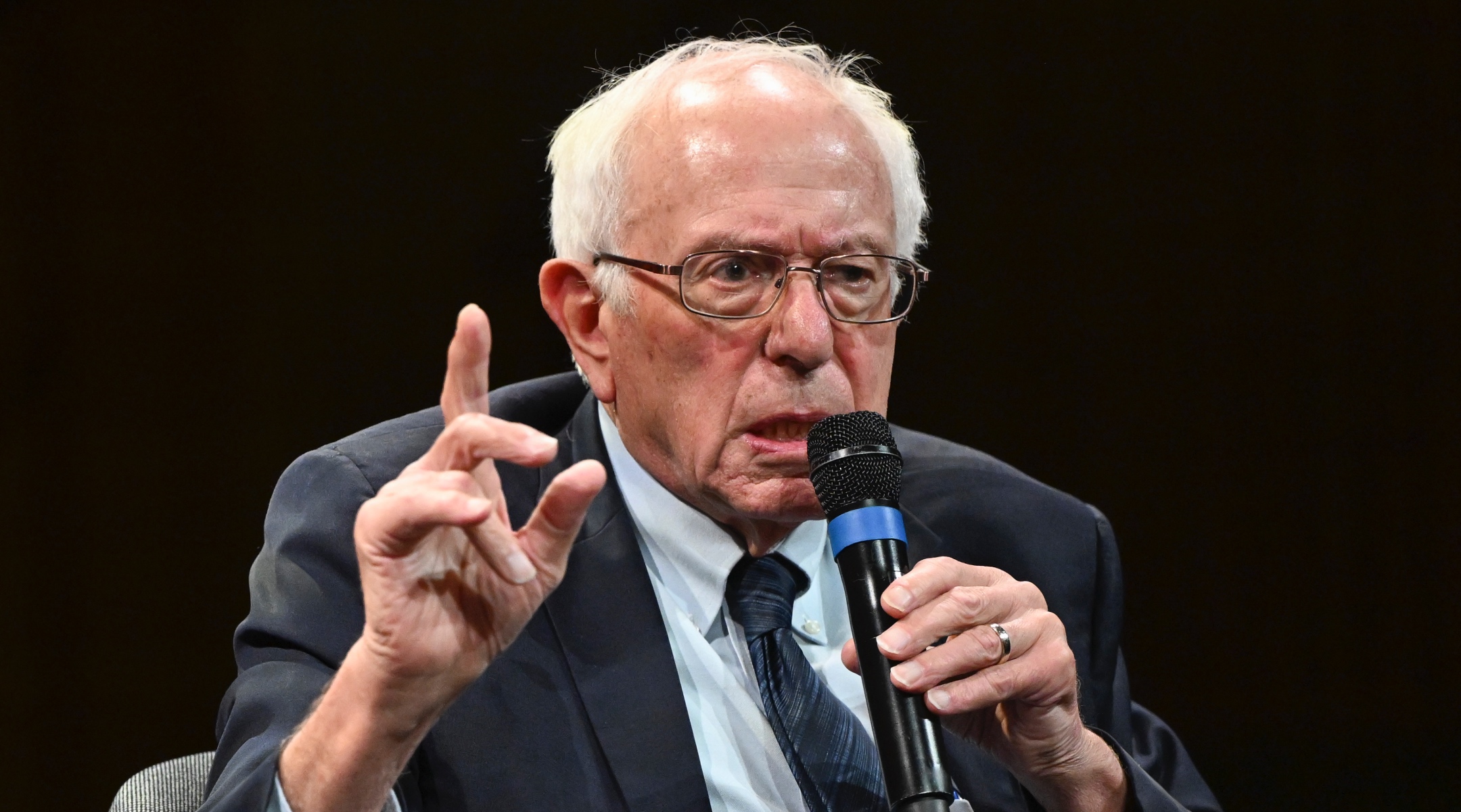In an unusual twist, AIPAC praises Bernie Sanders over his Israel-Hamas cease-fire stance
Sanders later distanced himself from the pro-Israel lobby, in the latest example of how a fissure among progressives is affecting politics

U.S. politician Bernie Sanders at the launch of his book “It’s Okay to Be Angry at Capitalism” at the House of World Cultures in Berlin, Oct. 12, 2023. (Jens Kalaene/dpa/picture alliance via Getty Images)
WASHINGTON (JTA) — For a few hours on Sunday, the unthinkable happened on social media: AIPAC promoted a clip of Bernie Sanders talking about Israel.
Hours later, that praise prompted Sanders to write a post distancing himself from the pro-Israel lobby.
Sanders, the Jewish Vermont senator and unofficial leader of progressives on Capitol Hill, has broken with many of his allies in recent weeks over their approach to Israel’s war with Hamas in Gaza. While members of Congress such as Reps. Alexandria Ocasio-Cortez and Rashida Tlaib have called for an immediate ceasefire in the fighting, Sanders has backed the position of the Israeli government and Biden administration — opposing a ceasefire because it would leave Hamas in power after it killed and wounded thousands in its Oct. 7 attack on southern Israel.
“Well, I don’t know how you could have a ceasefire, permanent ceasefire, with an organization like Hamas, which is dedicated to turmoil and chaos and destroying the state of Israel,” Sanders told Dana Bash on CNN’s ” State of the Union.” “And I think what the Arab countries in the region understand [is] that Hamas has got to go.”
Within an hour of the interview, soon after 11 a.m., the American Israel Public Affairs Committee posted the clip on X, the platform formerly known on Twitter.
“Sanders answers @DanaBashCNN about fellow progressives calling for a ceasefire,” AIPAC said, and tagged a number of those progressives, including Ocasio-Cortez of New York, Summer Lee of Pennsylvania, Cori Bush of Missouri, Jamaal Bowman of New York, Ilhan Omar of Minnesota and Mark Pocan of Wisconsin.
“Thank you @SenSanders for your clear and principled opposition to calls for a ceasefire with Hamas,” it said in another tweet two hours later.
The series of comments accentuated a fissure between progressives advocating for an immediate halt in the fighting and others — led by Sanders and, in the U.S. House of Representatives, Ro Khanna of California — who are not ready to press for an immediate ceasefire, but who want Democrats to be more outspoken in calling Israel out for its excesses.
The episode also prompted some former Sanders fans to denounce him.
“Biggest political disappointment of our generation,” wrote Briahna Joy Gray, the top spokeswoman for Sanders’ 2020 presidential campaign, in one notable response.
AIPAC’s friendliness was jarring, given acrimony in recent years between Sanders and AIPAC. Before he ran for president in 2016, Sanders enjoyed a cordial relationship with the lobby and attended its annual conferences. But he skipped the conference in 2016 to campaign, and AIPAC would not allow him to address it remotely — an option it had offered candidates four years earlier. Four years later, mounting his second presidential campaign, Sanders heeded calls from progressives and declined to address AIPAC.
Later on Sunday, Sanders made clear that the affection wasn’t mutual. In a post on X, he wrote, “@AIPAC has supported dozens of GOP extremists who are undermining our democracy,” he said. “They’re now working hard to defeat progressive members of Congress. We won’t let that happen. Let us stand together in the fight for a world of peace, economic and social justice and climate sanity.”
The post was a nod to Ocasio-Cortez and other prominent progressives, who posted the same critique of AIPAC days earlier. In a post on Tuesday, Ocasio-Cortez called AIPAC “racist and bigoted,” as well as “an extremist organization that destabilizes US democracy.” On Monday, Punchbowl News reported that Mike Casca, Sanders’ deputy chief of staff, was taking a new job as Ocasio-Cortez’s chief of staff.
An official in Sanders’ office confirmed that Sanders wrote his post in part because he wanted to make clear that he was not happy with AIPAC’s praise. Elsewhere in the CNN interview, Sanders also made clear that he disagrees with Israel’s handling of the war in Gaza and advocated a position AIPAC vehemently opposes — that aid to Israel should be conditioned on its behavior.
“It is no great secret that the United States provides $3.8 billion every year to Israel,” he said. “Now they can say that they don’t want the money — fine. But if they’re going to take our money and Biden wants to give them even more, they have got to recognize that they cannot offend American values, what we stand for what civilized world stands for.”
This article originally appeared on JTA.org.















